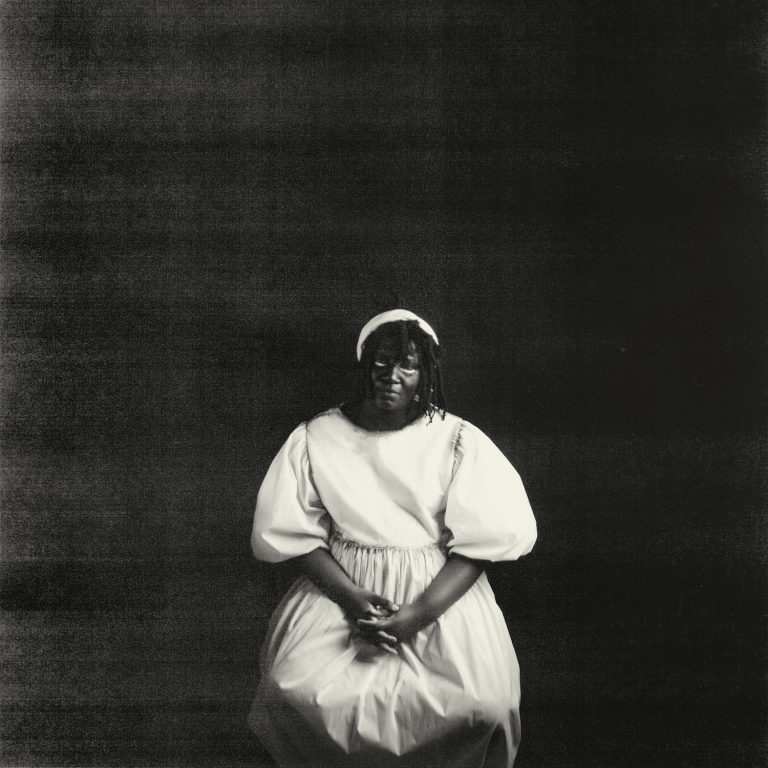Ashanti Mutinta’s first four albums as Backxwash bulge with a ferocity that tears at the listener, ripping away defenses, rationalizations and deep-seated denials. Injustice thrives, she reminds us, abuse propels the human story. The aberrant is the norm. With every utterance, Mutinta lambasts the social landscape as we know it, critiquing the way in which the world’s toxicity – inculcated via schools, family, politics, religion – is internalized generation after generation, the primary and unfortunate legacy of the human race.
With her new album, Only Dust Remains, the signature rants endure. But also present is a weariness or ambivalence, an inchoate acceptance that emanates from various passages. Mutinta is still irate and has much to say regarding the poisonous environments in which we live our allotted years; she also, however, seems to occasionally drift… if not into, at least toward some form of forgiveness (of others as well as herself). In this way, Dust serves as a coda to her stunning trilogy (2020’s God Has Nothing to Do with This Leave Him Out of It, 2021’s I Lie Here Buried with My Rings and My Dresses, and 2022’s His Happiness Shall Come First Even Though We Are Suffering), Mutinta doubling down on the rage that has defined her career and, in part, moving beyond it, clearing space for whatever possibilities might ensue.
“Black Lazarus” opens with a catchy vocal palimpsest, Mutinta experimenting with her own version of the rap-and-hook template. “I’ve been away from a place of balance”, she begins, echoing a confession she’s made and remade throughout her career, though her voice is more reflective and inward-leaning than on earlier work. Sonically, too, Mutinta’s new tracks are generally less incendiary, as she largely replaces hardcore and horrorcore gestalts with more restrained synths and jazzy percussion. As “Black Lazarus” approaches its closing, Mutinta’s voice grows more insistent, the audial mix more confrontive. Again, however, rather than pivoting into a noise-fest, the music swells elegantly like the soundtrack of a big-budget war or spy film (Bond!), burnished synths and spry drums complementing string refrains.
“Wake Up” serves as a vehicle for Mutinta’s sense of urgency and features the rapper at her most fluid vocally. The track touches on several of Mutinta’s pet themes: dissociation (“How long it been since I felt my pulse in the shin”), addiction (“I burn my teeth with every drank / I tell my peeps it’s medicine”), and PTSD (“Life as a kid, the fuck happened to me?”). Mutinta’s fury, as mentioned above, has always been a spectacle to behold, occurring as a kind of archetypal or energetic eruption, and here she puts it on unbridled display. She then segues into a more austere segment, declaring, “I’m spending all night attempting not to judge myself”, pointing to the beast of capitalistic conditioning.
On “Undesirable”, Mutinta ponders the nature of shame and loneliness as an existential given. The musical backdrop, however, is sans distortion, almost more classically oriented, evoking a part Ryuichi Sakamoto might’ve crafted had he guzzled a six-pack of Mountain Dew or popped a handful of amphetamines. A pop-inflected vocal mix carries the final 30 seconds or so of the track, a studio-rendered fade-out one would anticipate finding on a more conventional release (think Paris Texas if produced by The Alchemist). “9th Gate” unfurls as an ambient sketch that furthers Mutinta’s desire to explore new territories, at least sonically.
On “DISSOCIATION”, Mutinta waffles on her “Wake Up” admission, as trashy drums and a droney synth converge on her voice. “I don’t think I’m an addict / I’m just really unhappy”, she proclaims, repeating the single most popular statement of addicts across the cosmos, the words that can still make a seasoned counselor cringe (while trying to maintain a poker face). Throughout the piece, brash accents unfurl. A crunchy atmosphere swells and shrinks, as Mutinta seeks to transcend the effects of personal and intergenerational trauma. Torqued synths and a chorale effect nudge the piece toward a pop-goth sound more than anything committedly metallic or industrial, the sort of mix that Circuit des Yeux or Chelsea Wolfe or even early Yeule would find intriguing.
“History of Violence” features glitchy electronics, Mutinta’s voice louder and more prominent in the mix. The track serves as a damning take on socio-cultural abuse and how that abuse shapes our self-talk and self-image. This is Mutinta at her most macro a la Moor Mother, though her focus is experiential, whereas Moor Mother is more typically intrigued by the meta-existential and historical, and the way the two interweave. Mutinta’s rapid-fire pace is juxtaposed by a synth-and-string soundscape, as if she’s being accompanied by a classical quartet or pared-down orchestra.
By the time Mutinta reaches Dust’s closing track, she appears to be on more solid footing. “I don’t need a reverend or a reference to Heaven”, she declares, claiming her own instinctive/intuitive ability to access the divine, to find bearings, purpose. The included clip from Nina Simone (“What I hope to do all the time is to be so completely myself …”) clarifies Mutinta’s ambition for emotional and cognitive agency, even if, throughout her work, she’s expressed suspicions regarding self-determinism, conjuring the notion of fate or predestination; i.e., feeling proverbially fucked.
Mutinta isn’t retracting her take on the world; she’s unapologetic in her condemnation of our institutions and the way they impact our sense of worth (and/or lack of it). At the same time, she’s researching new sonic directions as well as a somewhat more paradoxical take on human life. She hasn’t fully ascertained how to recast her aesthetic without diluting her presence, but with Dust she inches toward reinvention. Mutinta’s a magician who’s expanding her repertoire, forging new alchemical practices. Dust is ultimately a “between” project; we’ll see where it leads.

